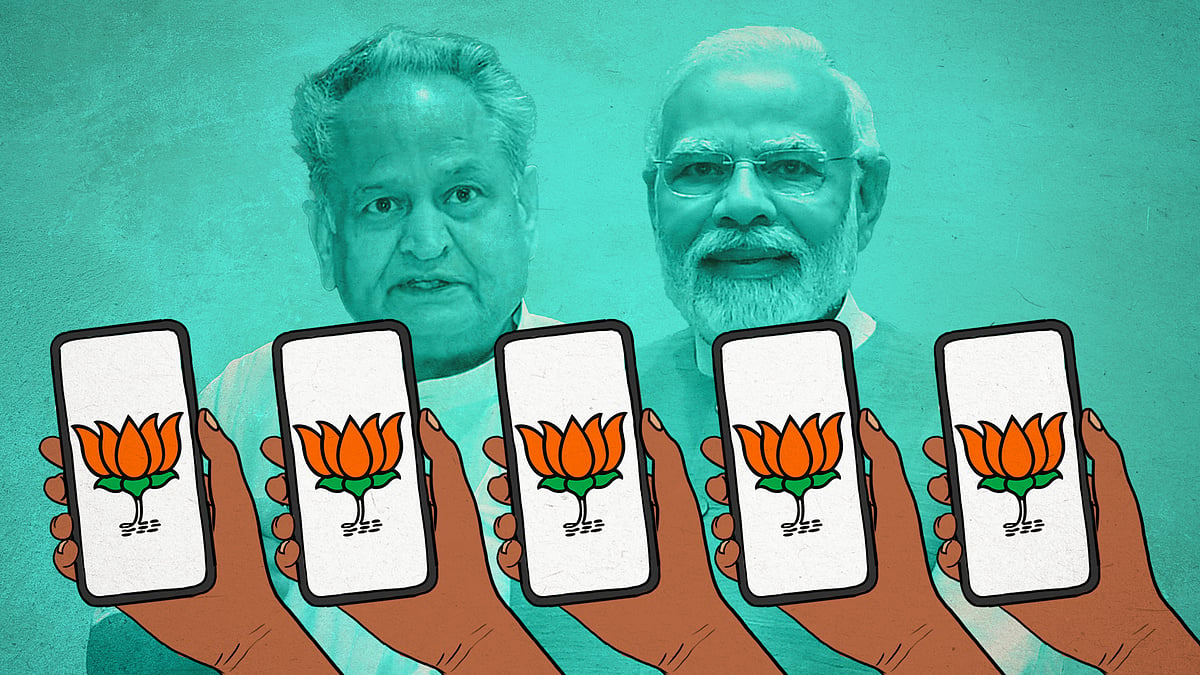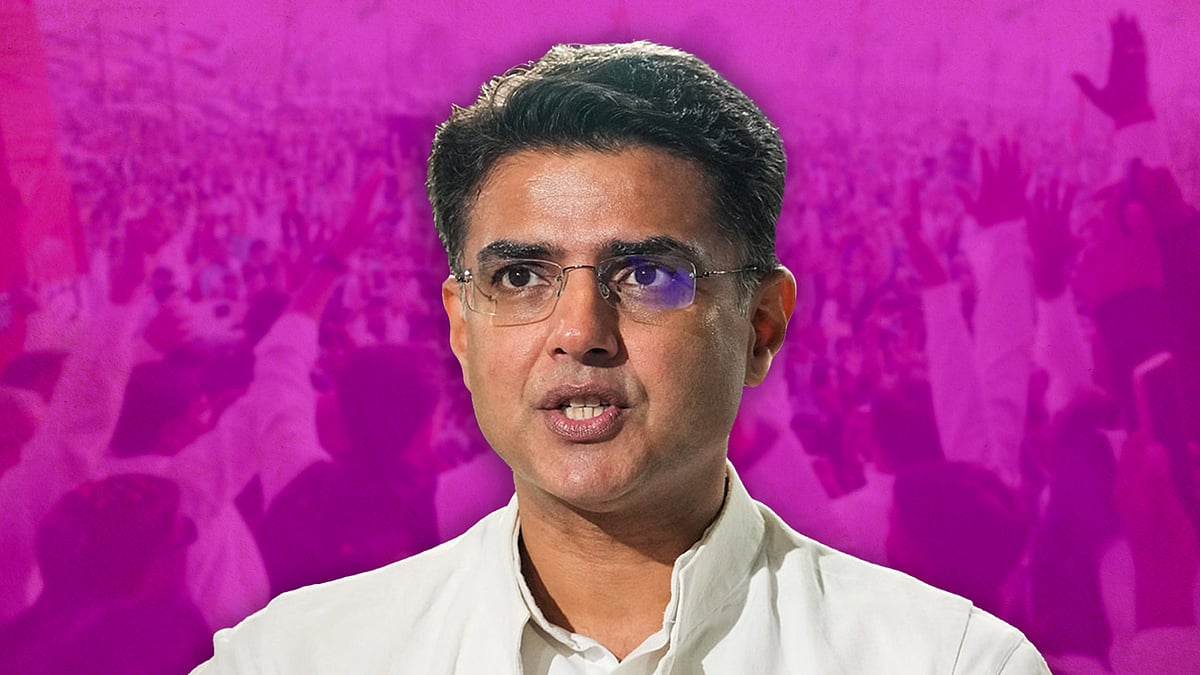Who are the ‘gypsy entrepreneurs’ behind India’s colourful election campaigns?
A small set of campaign material suppliers hold a key role in making elections the ‘festival of democracy’ in India.
In the heavyweight poll-bound state of Rajasthan, capital Jaipur offered a spectrum of colours on November 21 – chief minister Ashok Gehlot’s pink, Congress’s blue, and the Bharatiya Janata Party’s saffron. The city was hosting two big political events: the Rajasthan Congress’s manifesto launch and Prime Minister Narendra Modi’s roadshow.
While the BJP workers prepped the Sanganeri gate for PM Modi’s roadshow, the Sansar Chandra road leading to the Congress state head office was decked up with party flags.
Ashish Upadhyay – a 42-year-old atypical vendor and modern day ‘election gypsy’ – sat at his rented shop on the road and watched the Congress workers put up these flags at dawn.
Seated beneath a banner that read ‘Chunav Prachar Samagri’, election campaign material, Upadhyay waited for Congress workers to come and buy from his well-stocked party flags that he had carried all the way from Delhi.
But his anticipation waned at noon as he saw Congress flags being taken off minutes after party president Mallikarjun Kharge and CM Gehlot left the head office. “There was a time when candidates and party workers walked to us upfront, now they usually stick to big manufacturers,” Upadhyay said. He had moved to Rajasthan about two months ago from his home in East Delhi’s Bhajanpura.
He leaves his home every few months to travel to poll-bound states and set up temporary shops near party offices. “I chose to come to Rajasthan since it offered the most scope for business this time as the BJP wants to come back to power. They have a much louder campaign.”
A corner table at his temporary store holds badges with PM Modi’s face, BJP flags of six different sizes, BJP, Congress, and Bahujan Samaj Party bands that can be worn around the neck, and a wide variety of wearables with party symbols.



Upadhyay has been in the business for over 15 years and has worked with candidates from Congress, BJP, Rashtriya Janata Dal, Jharkhand Vikas Morcha, and Jharkhand Mukti Morcha, among others.
“My first stint was in 1998. I had just cleared class 10th when my mother decided to contest legislative assembly elections from East Delhi. She was a member of the Congress but was denied a ticket. My father and I then designed her campaign – voter slips, banners, flyers, and anything printable was printed with her name,” he said. While Upadhyay shifted to the banking sector after school, he was forced to leave his cushioned job at Barclays in Delhi during the 2008 recession.
With a wish to switch lanes, his brother and he then decided to supply campaign material to parties in the assembly elections in Jharkhand in 2009. “I used to run after party workers in local offices for numbers. We reached out to candidates from all parties and managed to make a big profit.” But nine years later, it was in Jharkhand that Upadhyay and his family faced another crisis.
Of the wide variety of campaign materials Upadhyay and several other such businessmen sell, a popular one is the EVM demo machine – which candidates use to create awareness among voters in their constituencies about their ballot numbers. “This helps voters identify which number to press on for the candidate they like because the EVM demo machines are given out with a photo and the name of that particular candidate,” he said, adding that these are the most sought after items in the last week of campaigning.




Upadhyay claimed that during the 2018 Jharkhand local body elections, the local police shut down his shop and charged his father and brother with election manipulation for distributing the demo EVM machines. “They were charged under sections 420 (cheating and dishonesty) and 124A (sedition). They had to spend a few nights in jail, but the court soon granted them bail. We weren’t allowed to sell anything else there for a few months,” he said, adding that the case is still going on.
Spending nights in jail seems to be a common trope for Upadhyay, and others engaged in the business.
A few metres away from Upadhyay’s store is another temporary shop filled to the brim with various campaign items. It is run by 33-year-old Chetan Aggarwal, who has been in the business for over 10 years. He too has faced imprisonment.
“I had to spend about 24 hours in jail in 2011 during the Bihar municipal polls for hanging my shop’s banners over the Lahariya Sarai tower in Darbhanga,” he said, recalling how he watched the India vs Sri Lanka T20 World Cup finals the same night in the jail. He was charged with defacement of government property but was let go with a fine of Rs 1,100.
Aggarwal began his stint in 2010 with the Uttar Pradesh panchayat polls. With an investment of Rs 52,000, he collaborated with a friend who ran a printing press and managed to garner a profit of Rs 1 lakh for himself. While originally from Uttar Pradesh, Aggarwal moved to Delhi after his first project, and has since been staying at Najafgarh. But he moves to the poll-bound states every few weeks for business.
Unlike Upadhyay who directly engages with candidates contesting in elections, Aggarwal sells his products to shop owners, which, he claimed, is a busier line.
Amid calls from shop owners every few minutes, he said dealing with candidates requires a lot more back-and-forth due to issues with designs. He also listed out “star candidates” he has worked with. These include BJP MLA Thakur Jaiveer Singh and former BSP MLA Ramvir Upadhyay in Uttar Pradesh.
Aggarwal claimed that he was one of the Aam Aadmi Party’s official vendors in 2013 – the year Kejriwal became Delhi’s CM for 49 days. “I was forced to quit because of the BJP. They said they will not work with me as long as I was listed as an on-paper vendor for the AAP. But as soon as I quit, neither of the parties offered me any work,” he said.
Facing the odds, losses
Both Upadhyay and Aggarwal added that though this is a high-pressure job, they are happy to do it – even if it requires staying away from home every few weeks.
“My daughters ask me to find a new job and stay at home, but this line of work is almost addictive. The biggest players in this field would also not leave it, even if they become millionaires,” said Upadhyay, adding that as soon as the Rajasthan polls end, he will start preparing for municipal body elections in Punjab, and eventually for the 2024 general elections.
The men said that days ahead of the municipal elections result is the most profitable for them because a wide variety of people contest the elections. “The customers walk up to us, we don’t have to go to them. There is no dearth of candidates,” said Aggarwal.
However, both the vendors said that losses are also a common part of the business.
This month, Upadhayay could manage to earn only about 20 percent of the profit he usually earns during assembly polls, he said. Meanwhile, Aggarwal, who invested about Rs one crore for the Rajasthan and Madhya Pradesh polls, was only able to earn enough to balance out the investment, he emphasised. “I almost earned nothing.”
Aggarwal also tried his hand at manufacturing a popular neck band design seen in the polls this year – featuring PM Modi’s face with a map of Rajasthan – but was unable to produce them in time, which cost him Rs 20 lakh.



Upadhyay, who was supplying material to AAP’s Umar Daraz, faced another hit after Daraz decided to step down from the contest. Sitting next to boxes filled with voter slips made in Daraz’s name, Upadhayay said that he had only been paid half of the bill in advance. “I don’t know if I will be paid the rest. This is a loss I will most likely have to suffer on my end.”
Despite the uncertainty in this business, both refuse to quit. “The potential for a quick turnover is very high, since elections are a pumphouse of money. Whatever is hidden in lockers and under beds for five years, comes out in the last few months,” said Upadhyay.
Aggarwal added: “Politics has always been a business, it was never about social welfare.”
Ground reports like these take time and resources. Help us tell more stories that you want to hear. Subscribe today.
 Lord Ram, Congress-bashing, Kanhaiya Lal: Inside Rajasthan BJP’s election war on WhatsApp
Lord Ram, Congress-bashing, Kanhaiya Lal: Inside Rajasthan BJP’s election war on WhatsApp Congress ‘sidelining’ Pilot: Tonk voters say he’s ‘absent’, but still better than BJP
Congress ‘sidelining’ Pilot: Tonk voters say he’s ‘absent’, but still better than BJP